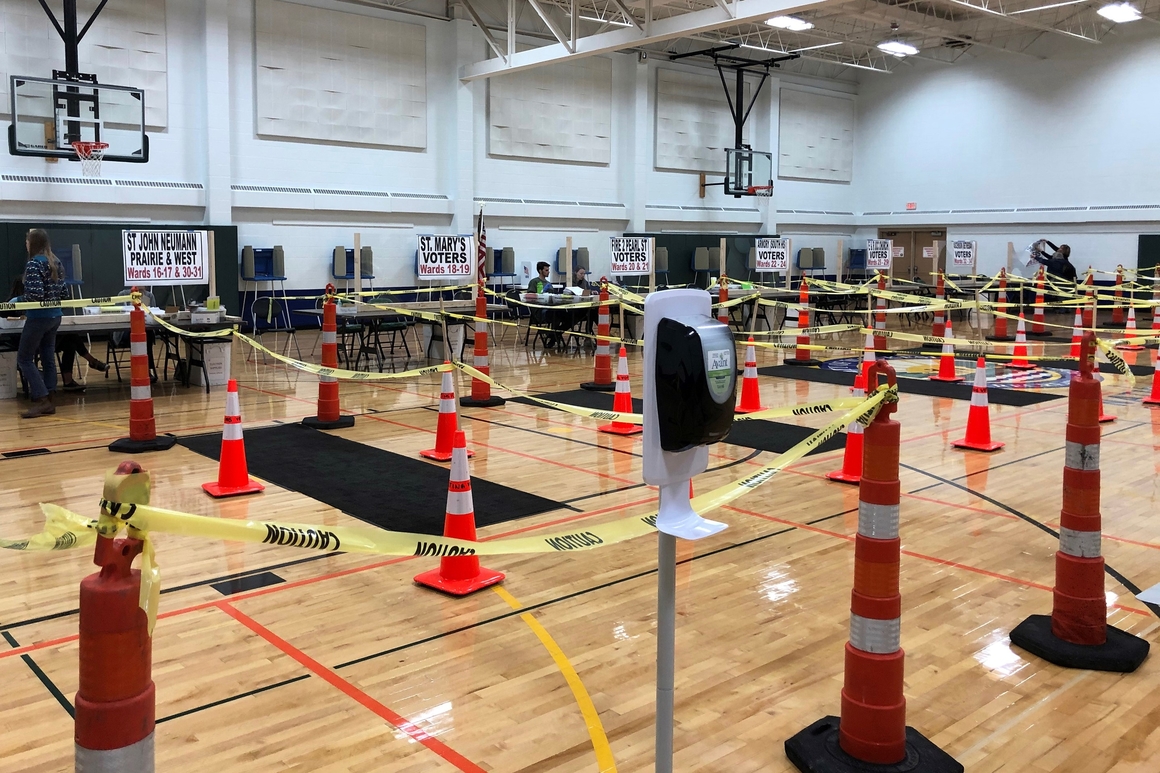
The political and policy stakes of that contest are high: The court was responsible for upholding the controversial 2011 law that limited public workers’ collective bargaining rights — the measure that sparked bitter, nationally watched recall efforts aimed at Walker and a number of legislators. More recently, the court sided with Republicans in upholding a series of laws aimed at limiting Evers’ power. Those so-called power-grab laws were passed after Evers defeated Walker in 2018, but before he was sworn into office.
The outcome of Tuesday’s Supreme Court contest — which pits Republican-backed incumbent Justice Daniel Kelly against Democratic-backed Dane County Circuit Judge Jill Karofsky — will either secure the GOP’s 5-2 grip on the court or expand Democrats’ power at a time when the court could have a say over upcoming redistricting and other lightning rod issues.
Since turnout is expected to be low Tuesday, Republicans have an interest in seeing Tuesday’s election move forward — they believe that gives their preferred candidate an advantage. Democrats, who believe higher turnout gives their candidate an edge, worry they will be at a disadvantage since polling sites in Democratic areas have been most adversely affected by the poll closures.
Milwaukee, for example, is going from 180 to just five polling sites. It’s already experienced disruptions in early voting while more predominantly Republican areas of the state did not. There are so few poll workers, the National Guard has been activated to help fill the vacuum.
In most states, a Supreme Court contest would hardly merit national attention. But in Wisconsin — where the candidates are ostensibly nonpartisan — both Bernie Sanders and Joe Biden have endorsed the Democratic-backed candidate. Trump has also endorsed, going so far as to single out the contest in an official White House briefing. Then, in front of the cameras, Trump accused Democrats of a political ploy by calling for a last-minute delay in the election.
The pair of rulings Monday by the Wisconsin Supreme Court and the U.S. Supreme Court pushing through the election and limiting absentee voting could have consequences for November’s presidential election, when Wisconsin figures to be one of the hardest-fought swing states.
“We’re a tipping-point state by lots of people’s measures. Winning Wisconsin is what got Trump over the hump and is probably going to make the difference in 2020,” said Sachin Chheda, a Milwaukee-based Democratic consultant. “The stakes are higher here. Races matter because they’re very close. Race after race after race are won by the thinnest of margins.”
Nowhere was that clearer than in 2016, when Trump won the state by just 23,000 votes. Republicans suddenly viewed Wisconsin as the state that handed Trump the presidency; Democrats looked at Wisconsin as a stinging reminder of their flagrant failures in 2016: It was the state Clinton took for granted and failed to visit in the general election.
The result only ratcheted up the stakes in subsequent state contests. To Democrats, that meant ousting Walker, a national GOP star loathed by those across the aisle. The midterm contest quickly evolved into a massive clash as well as a proxy war between the parties and various national groups on the left and the right — campaign spending hit a state record of $93 million.
Every major Democratic presidential hopeful, from Elizabeth Warren to Biden, came through the state. So did former President Barack Obama.
Evers narrowly ousted Walker, and when he did Democrats openly taunted Walker for not being able to ask for a recount. The governor had signed a law a year prior that triggered a recount only if the vote difference fell below 1 percent. Walker lost by a 1.2 percent margin.
“It used to be Wisconsin was a third, a third and a third — Democrat, independent and Republican. But most of the messages that are out there now, they’re base drivers,” said Brandon Scholz, a longtime Republican strategist. “They’re so focused on the base that you wonder: Is there nothing left in the middle anymore?”
In both parties, there are fears that the bruising fight to delay Tuesday’s election is just a taste of what’s to come in the fall, when Wisconsin figures to be central to the outcome of the presidential race. Major super PACs have already been spending money for months, including Democratic PACs that began intense digital advertising last year.
“Wisconsin is such a big prize, they’re going to throw a lot of money at this thing,” Scholz said of the November election. “Democrats can’t afford to lose Wisconsin, neither can Republicans.”
Source: politico.com
See more here: news365.stream






